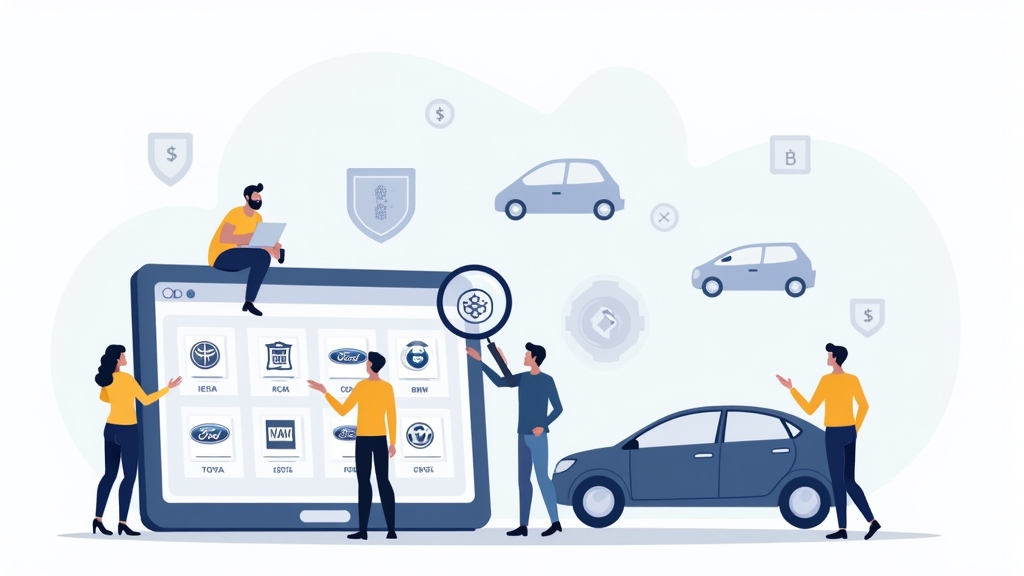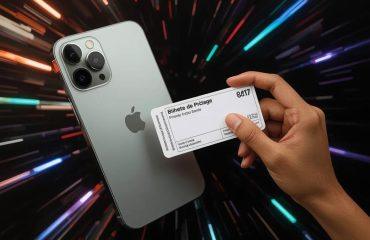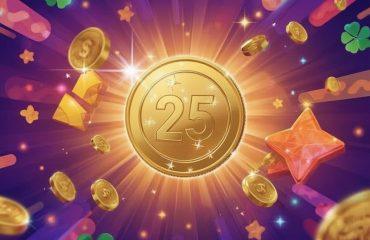advertising
Imagine winning a zero kilometer car simply by taking part in a prize draw. Sounds like a distant dream, doesn't it? For many people around the world, this dream has become a reality through legalized car raffles. We're talking about a type of promotion where you buy a coupon or fill out a registration form, often with a very small investment, in order to compete for a brand new car. The key to participating safely and intelligently lies in understanding how this ecosystem works.
This is no ordinary lottery, but a well-structured marketing strategy where companies and institutions use high-value prizes to attract the public's attention to their brands, products or causes. The feeling of having a real, almost tangible chance of driving home in a brand new car is what fuels the interest of millions. But how do you separate the genuine opportunities from the traps? The answer lies in education. By mastering the basics, you turn a remote possibility into a strategic and, above all, safe activity.
advertising
The first question that arises is: why would a company give away a car for free? The logic is purely mathematical and marketing. A raffle campaign is, first and foremost, an investment in advertising. The cost of a vehicle, such as a popular Fiat Pulse or a luxury SUV, is far outweighed by the volume of engagement, lead generation, an increase in the customer database and the immense media reach that the promotion generates. Think about it: the announcement of a prize draw for a car is much more attractive and shareable on social media than a conventional advertisement for a product. People don't just see the advertisement, they interact with it, sign up, share it with friends and family and, in the process, are exposed to the organizing brand countless times. It's a win-win exchange: the company gets visibility, and you get the chance to win an extraordinary prize.
It is crucial, however, to establish a fundamental difference: legalized sweepstakes are not gambling in the traditional sense. They are governed by a specific set of laws and regulations that vary from country to country, but which generally share common principles such as transparency, a level playing field and oversight. The legality of the process is its greatest guarantee. While in a state lottery you buy a ticket with a sequential number, in a car raffle, participation can be linked to a knowledge question, filling in a form with your details or the symbolic purchase of a product. This nuance is what, in many jurisdictions, differentiates a commercial promotion from an illegal game of chance. Therefore, your first safety filter should always be to check the suitability and legal compliance of the prize draw. Be very wary of any promotion that requires very high entry fees or does not clearly disclose its rules.
Let's take a practical example to solidify this concept. Suppose a large supermarket chain is organizing a prize draw to celebrate its anniversary. The prize is a sports car. To take part, you need to make a minimum purchase of 50 units of the local currency and fill in your details on the receipt available on the promotion website. This is a classic and legitimate model. The company is boosting its sales (the commercial objective) and offering an attractive prize. The regulations will be available on the website, with all the clauses, the date of the draw, how it will take place (usually at a notary's office or before a public body) and the criteria for the winner. Now think: have you ever come across an opportunity like this? You probably have. The point is that many people ignore it because they think "it never happens to me". But what if, this time, you decided to try? The first step is precisely to change this mentality and start seeing these promotions as real opportunities, provided they are approached with due diligence.
Identifying Legitimate Opportunities in the Midst of Digital Noise
We live in the information age, and it is precisely in this ocean of data that the best (and worst) opportunities are hidden. Finding legitimate and affordable car sweepstakes requires a thorough and strategic search. Many people's first instinct is to type "free car raffle" into a search engine, but this naive approach is an invitation to fall for scams. Fraudsters invest heavily in SEO (Search Engine Optimization) to get their fraudulent sites to the top of the results. So how do you navigate these turbulent waters? The answer lies in consolidated sources and cross-checking information. You need to become a promotions detective.
Start with the most obvious and reliable sources: the official websites of the automakers themselves. Companies like Toyota, Ford, Volkswagen, Hyundai and, of course, Fiat, often launch national or regional campaigns to launch new models or boost sales. A new Fiat Pulsefor example, could be the flagship of a promotion to attract young people to dealerships. Sign up to receive newsletters from these manufacturers and follow their official social networks. Another extremely valuable source is the large retail chains, petrol stations, telephone operators and financial institutions. These companies have enormous advertising firepower and often use car sweepstakes as the flagship of their loyalty campaigns or commemorative dates. Keep an eye on economic and business news portals, which often report on the launch of big promotions.
Aggregating information is your best friend. There are websites and forums on the Internet dedicated exclusively to cataloging and analyzing sweepstakes and contests. One notable example is the Sweeps Advantage website, which, although focused on the North American public, illustrates the concept perfectly. In Brazil, there are several blogs and profiles on social networks that do this curation. The advantage of these aggregators is that they do the heavy lifting of verifying the legitimacy of the promotion, summarizing the rules and providing the direct link for participation. However, it is your responsibility to check the reputation of the aggregator itself. Participate in online communities, such as subreddits or Facebook groups, where members share discoveries and experiences. The wisdom of crowds can be a powerful tool for warning about scams and validating genuine promotions.
Now, let's talk about "digital noise" - the dozens of sponsored ads and unsolicited emails that promise instant riches. Your golden rule should be: if it sounds too good to be true, it probably is. A legitimate raffle will NEVER ask you to pay an advance fee to receive your prize. This is a classic scam. Likewise, be wary of promotions that don't have detailed and easily accessible rules. The regulations are the birth certificate of the prize draw. It should contain the full name of the organizer, the period of participation, the eligibility criteria, the method of drawing, the date on which the result will be announced and the details of how the prize will be awarded. If any of this information is missing, leak it immediately. Another red flag is urgency: "Take part now, the draw is tonight!" - pressure tactics are almost always indicative of fraud.
To illustrate, let's simulate a search. You're browsing Instagram and see an ad for a profile called "Global Car Sweepstakes". The ad shows stunning images of a Fiat Pulse and other vehicles. What do you do? First, click on the profile. Does it have a verified mark (the blue seal)? How many followers does it have? Are the posts recent and do they have real engagement (comments from real people)? Then look for the link in the bio. It should lead to an official landing page, preferably on the organizing company's website, and not to a strange, generic domain. Read the comments carefully, but remember that bots can inflate positive comments. The lesson here is: don't click on the first link you see. Investigate the source. This initial investigation, which only takes a few minutes, is the most effective barrier between you and a major headache. What would you rather do: waste five minutes checking or lose money and personal data to a scammer?
Mastering the Art of Strategic Participation
Finding a legitimate raffle is only half the battle. The other half, equally crucial, is to participate intelligently and efficiently. Participating strategically means maximizing your chances within the rules, managing your time and protecting your information, all at the same time. Many would-be winners make the mistake of signing up to every promotion without a method, which leads to fatigue and, worse, unnecessary exposure of their data. Let's change that. Think of it as a game of chess, not a scratch card.
A thorough reading of the regulation is its opening move. It's not just a quick read; it's a critical analysis. Identify the eligibility requirements. Some draws are restricted to certain age groups, residents of a specific country or professionals in a certain sector. Don't waste time if you don't fit in. Next, pay attention to the entry method. Is it necessary to buy a product? Is the purchase compulsory or is there an alternative method of free participation? In many countries, such as the United States, legislation requires that there be a way to participate at no cost - usually by sending a postcard by mail. This is very valuable information! If you don't want to or can't buy the product, the postal route, although more laborious, guarantees your participation for free.
Organization is the key to participation at scale. How do you intend to keep track of dozens or even hundreds of draws you've entered? Creating a simple spreadsheet can be revolutionary. In it, record the name of the draw, the link to the page, the closing date, the prize (for example, "Fiat Pulse 1.0″), the data you used to register and the status ("Entered", "Awaiting Draw", "Completed"). This prevents you from entering the same draw twice with different emails (which could disqualify you) and allows you to keep track of deadlines. Use a specific e-mail address just for sweepstakes. This keeps your main inbox organized and protects your personal email from more aggressive spam. Password management tools such as Bitwardencan help you securely store logins for various promotional sites.
Now let's talk about the most discussed tactic: frequency. Many draws allow multiple entries. How do you deal with this? If participation is via a single form, once is enough. But if the promotion allows one entry per day, create a reminder in your calendar to visit the page daily. Some sweepstakes use social media engagement as a criterion for extra entries - "share this post and tag three friends to win five additional entries". Assess whether it's worth the effort. Remember, your time is valuable. Sharing once in a while is fine, but spending hours a day on every promotion is unfeasible. The wisest strategy is to focus on quantity with quality. Enter a large number of legitimate sweepstakes, but do it quickly and neatly, without getting too deep into each one. The law of large numbers works in your favor: the more legitimate tickets you have in the ballot box, the greater your statistical chance of being drawn.
Consider this simulated experiment: You find out about a prize draw for a chain of coffee shops where the prize is a car. The rules allow one e-mail entry per day. Instead of registering just once, you set a quick reminder on your cell phone for 7pm, the time you're always on your way home from work. That's 30 seconds of your day to fill in the form. In a month, that's 30 entries. In three months, 90. Now imagine that you do this for 10 different draws simultaneously. In a year, you will have accumulated thousands of entries to win a car, with an almost negligible investment of time. This is the essence of strategic participation: consistency and automation of simple processes. Sound feasible to you? Most people don't have this discipline, which, ironically, increases the chances of those who do.

Uncovering the Hidden Costs and Economics of Cheap Sweepstakes
The word "cheap" in the context of car draws is relative and needs to be demystified. A cheap draw is not necessarily free, but one where the cost of participation is insignificant compared to the value of the prize, and where there are no hidden costs that arise after the draw. The promise of a Fiat Pulse or any high-value vehicle for a derisory sum is what attracts the masses. However, this is where many inattentive participants can fall into financial traps. Let's take a closer look at the economics behind these promotions.
The most common form of "cheap" raffle is one linked to the purchase of a low-cost product. You pay for chocolate, a magazine, a soft drink or a movie ticket, and the voucher is your entry. In this case, the cost is indirect. Were you willing to consume that product anyway? If yes, then participation is effectively free. If not, you need to count the value of the product as your "investment" in the draw. Another model is the raffle or prize auction, which is very popular in some countries. In these cases, a limited number of tickets are sold at a fixed price. If 10,000 shares of a Fiat Pulse If 100,000 monetary units are sold at 10 units each, the organization raises 100,000, covering the prize and operating costs. For the participant, 10 units for one chance in 10,000 of winning a 100,000 car is a statistically interesting cost-benefit ratio, as long as the raffle is legal and audited.
The danger lies in the hidden costs. The most nefarious of these is the aforementioned "release fee" or "processing fee" that scammers apply to "winners". But even in legitimate draws, there can be real costs for the winner. And it's crucial that you, as an informed participant, are aware of them. The biggest is income tax on prizes. In the vast majority of countries, the value of a car is considered income and therefore taxable. When you win a Fiat Pulse of 100,000, you may have to pay 20,000 or 30,000 in taxes to the government. A serious raffle always states in the regulations who is responsible for these taxes - whether it's the company or the winner. Other potential costs include licensing fees, vehicle registration and compulsory insurance for the first year. These can add up to a considerable amount of money.
To avoid surprises, you need to adopt the mindset of an accountant. Before entering any prize draw, read the section of the rules on "Winner's Obligations". It's all there. If it's not clear, contact the organizer to clarify. Ask directly: "In addition to the prize, will the winner have to pay any tax, registration or transfer costs?". The transparency of the organization in answering this question is a good indicator of its suitability. Remember, winning a car is a wonderful event, but it comes with financial responsibilities. Would you be prepared to pay the tax due if you were drawn tomorrow? It's a question worth thinking about. Plan mentally and financially for this possibility.
Let's take a concrete numerical example. Suppose a legitimate raffle for a popular car, such as the Fiat Pulsewhich costs 90,000. Participation costs 5.00 (either for a product or a donation to an NGO). The tax rate on prizes in your country is 15%. If you win, you will have to pay 13,500 to pay off the tax. Your total "cost" for the car would be 13,505.00 - still a fantastic deal! Now, if you take part in 20 draws like this in a year, spending 100.00 in total, your overall chance increases, and your maximum potential "investment" (if you win) would be 13,600.00 for a 90,000 car. That's the math that makes cheap draws such an attractive proposition. The key is to never spend more than you're willing to lose completely, treating it as entertainment with an extraordinary potential return.
Ensuring Your Digital and Financial Security
In today's hyper-connected world, the security of your personal and financial data is just as valuable as the prize you're aiming for. When you take part in dozens of sweepstakes, you are providing a significant amount of information: full name, date of birth, address, e-mail address and, in some cases, telephone number. In the wrong hands, this data can be used for spam, phishing, identity theft and bank fraud. So building a digital fortress around your privacy is not an option, it's a must for any serious participant.
The first line of defense is the aforementioned dedicated e-mail box. This is non-negotiable. Use free email services like Gmail or Outlook to create a dedicated address for promotions. This completely isolates any sweepstakes-related communication from your main digital life. Similarly, consider getting a disposable phone number or using virtual number apps for registrations that require SMS confirmation. Avoid giving out your main personal phone number as much as possible. When it comes to home address, assess the need. Many online sweepstakes do not require a full address at the registration stage, only at the time of winning. Prefer those that follow this logic.
The second line of defense is healthy skepticism about links and attachments. Phishing is the most common tactic used by criminals. You receive an email that looks like it's from the Fiat Pulse", congratulating you on being a finalist and asking you to click on a link to confirm your details. Stop! Don't click. Instead, go directly to the promotion's official website (by typing the URL in the address bar) and check your status in the participant's area, or contact them via the official channels listed in the regulations. Links in emails can take you to fake websites that are perfect copies of the originals, designed to steal your login credentials. Always check the sender's e-mail address. It will often have small imperfections, such as "[email protected]" instead of "[email protected]".
The security of your network is also crucial. Never, under any circumstances, take part in prize draws or fill in forms with personal data while connected to a public Wi-Fi network, such as those in airports, cafés or shopping malls. These networks are notoriously insecure and make it easy for hackers to intercept your data. Always use your password-protected home network or your cell phone's data network. Another layer of protection is the use of robust anti-virus and anti-malware software on your computer and cell phone. It can block access to known malicious websites and detect phishing attempts before you fall for them. Keeping your browser and operating system up to date is also vital, as frequent updates correct security flaws exploited by criminals.
Imagine this scenario: You've entered a prize draw that looks legitimate. A few days later, you receive a sleek email with the brand's logo saying that you have been shortlisted and need to update your bank details for a "security check" before the final draw. The email urges you to act quickly. What do you do? The correct answer is: delete the email immediately and mark the sender as spam. No legitimate promotion will ask for your bank details, credit card number or passwords at any stage prior to the prize draw. Bank details are only requested, if at all, after the official confirmation of the win, for the deposit of the prize money (in some cases), and even then through an extremely secure channel. The rule is clear: financial information is absolutely forbidden during the registration phase. Your security is in your hands. By adopting these practices, you turn the search for a car into a journey that is not only exciting, but also safe and controlled.
What to Do When Luck Knocks: The Aftermath
You've checked your dedicated email and there it is: a message with the subject "Congratulations! You're the winner of the Fiat Pulse!". The euphoria is instantaneous. The heart races. But what now? This is the moment when calm and rationality must prevail over emotion. The period immediately after being notified as the potential winner is critical and requires precise action so that your prize doesn't slip through your fingers. The first thing to do is to take a deep breath and not tell everyone on social media. Not yet.
The protocol for a legitimate raffle is very specific. The initial notification is usually made by email or telephone. If it's by phone, make a note of the caller's full name, their job title and a callback number. Ask for all subsequent communications to be formalized by email. When you receive the official congratulatory email, read it carefully. It should contain clear instructions on the next steps. Normally, you will be instructed to contact a lawyer or representative of the organizing company within a stipulated timeframe (usually 7 to 10 days). You will also receive an Affidavit of Eligibility and a Release of Liability to complete, sign and return. These documents certify that you meet all the requirements of the draw (age, residence, etc.) and that you release the organizers from future liability related to the use of the prize.
This is the time to revisit the regulations with a winner's eye. Make sure that all the information and processes described in the notification email are strictly in line with what is stated in the notice. Any discrepancies should be questioned immediately. Verifying the authenticity of the win is paramount.



